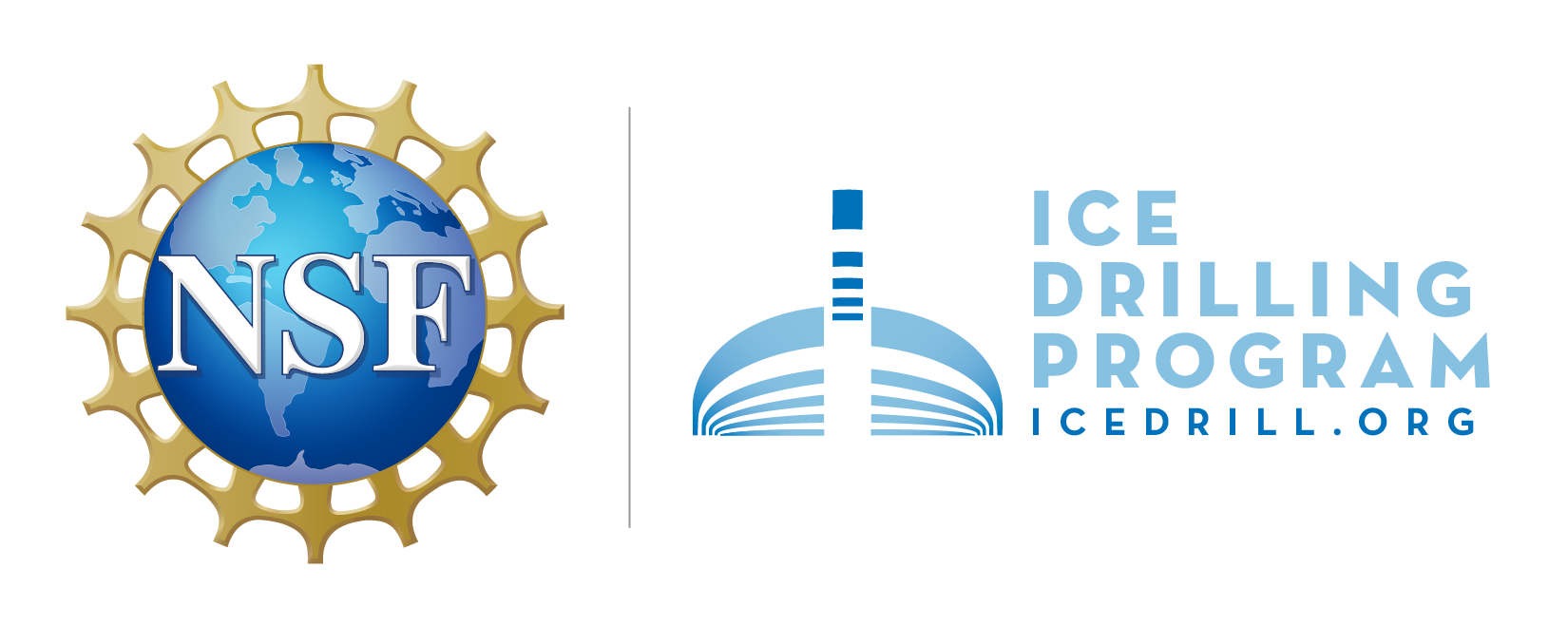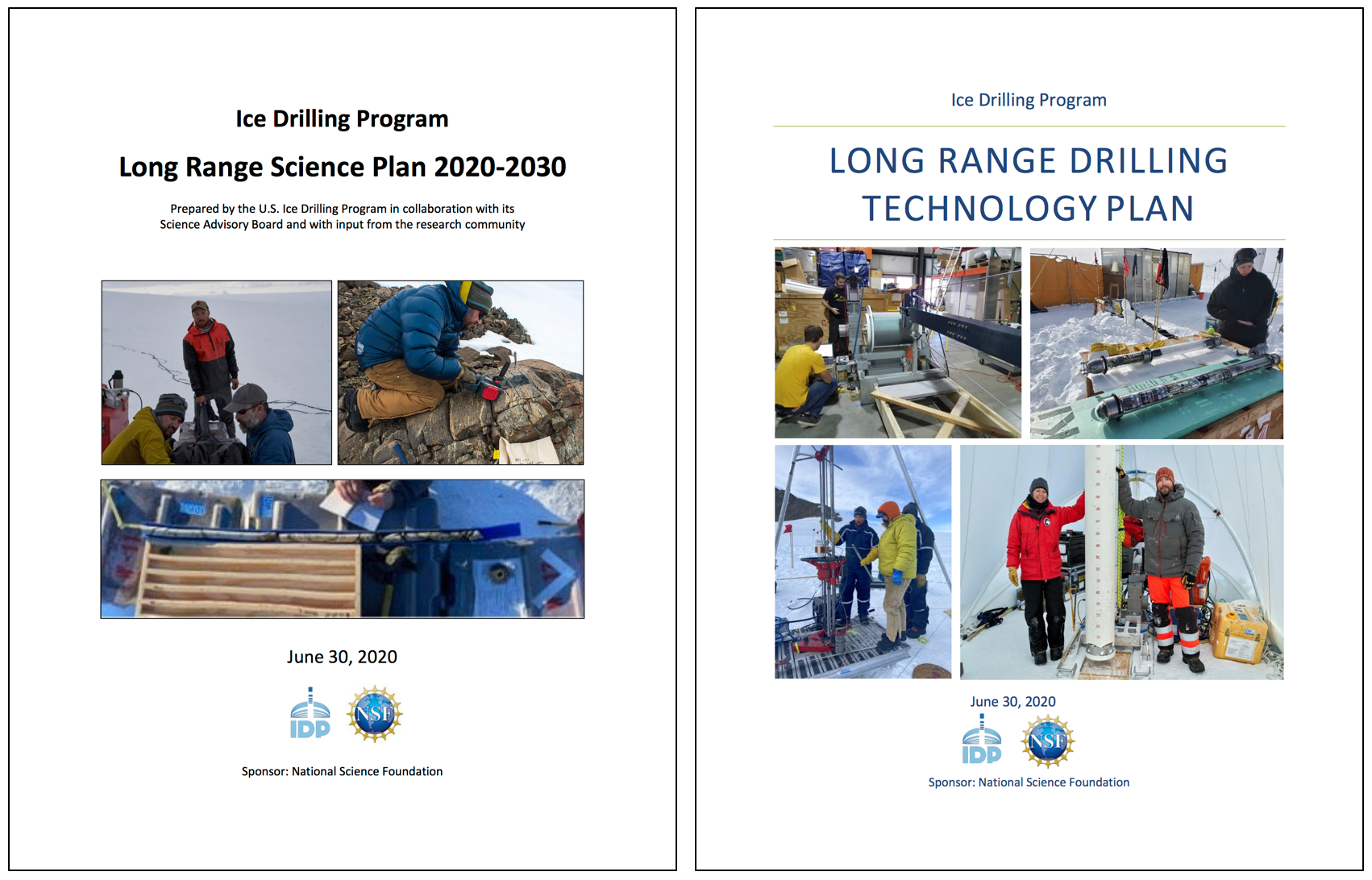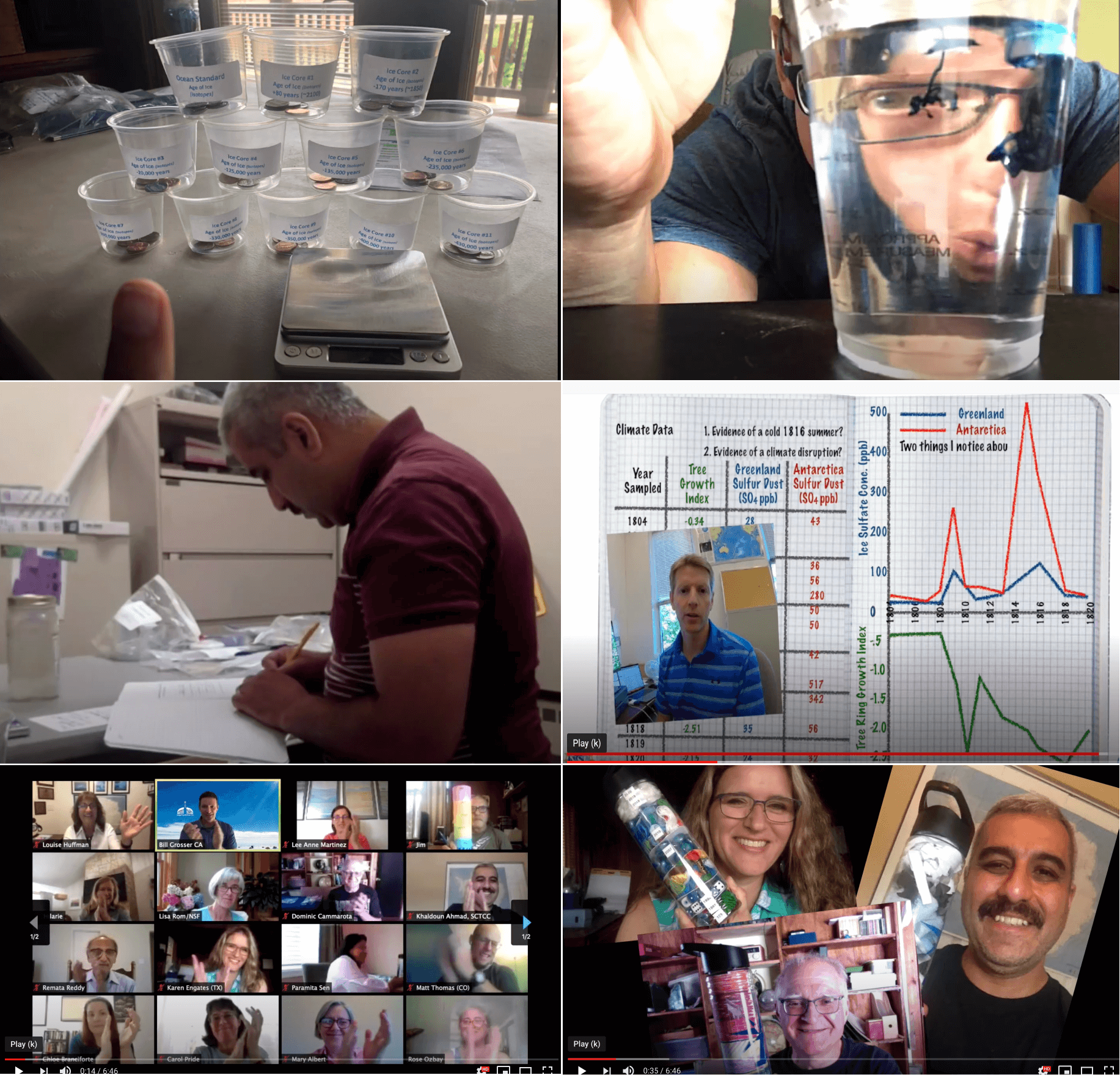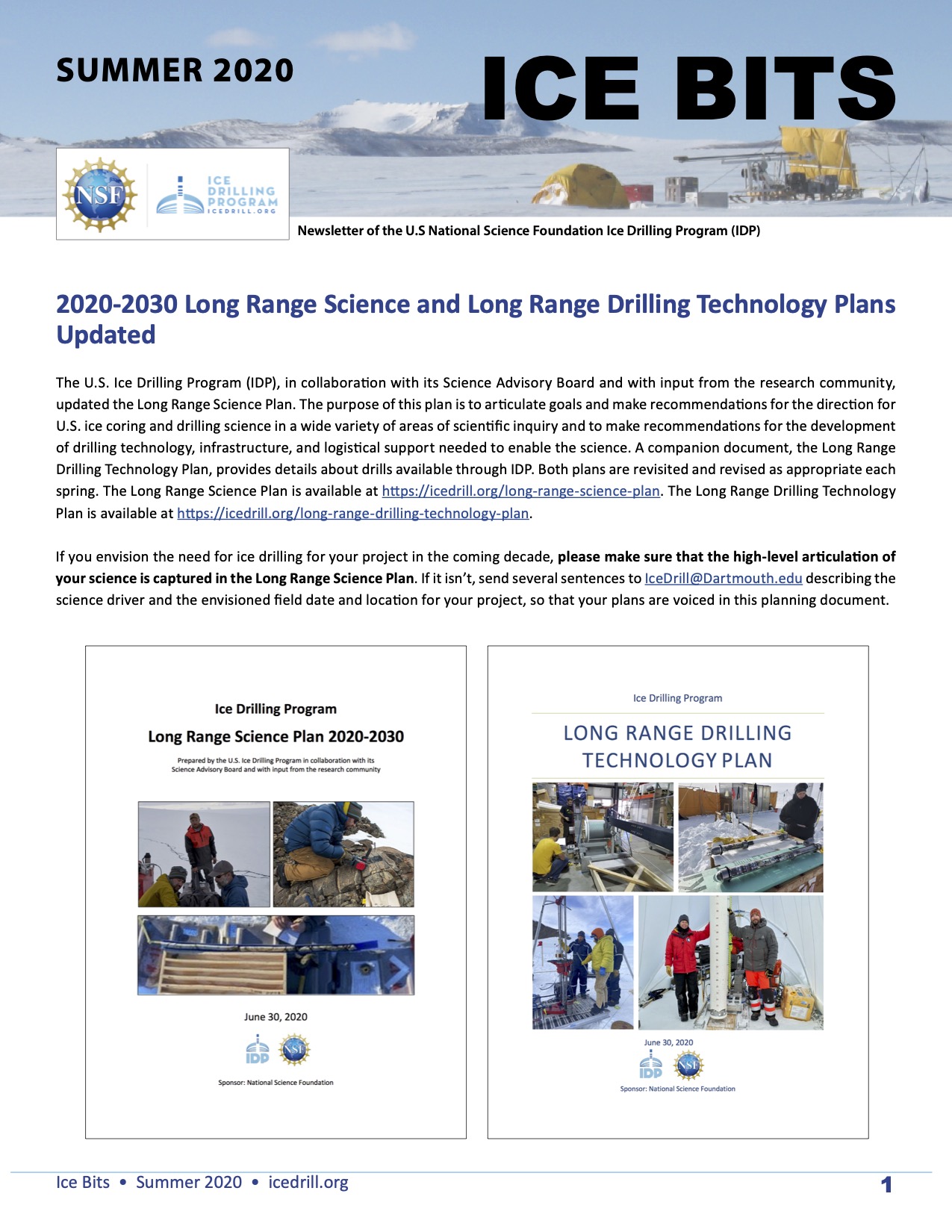2020-2030 Long Range Science and Long Range Drilling Technology Plans Updated
- Long Range Plans
- Fieldwork
The U.S. Ice Drilling Program (IDP), in collaboration with its Science Advisory Board and with input from the research community, updated the Long Range Science Plan. The purpose of this plan is to articulate goals and make recommendations for the direction for U.S. ice coring and drilling science in a wide variety of areas of scientific inquiry and to make recommendations for the development of drilling technology, infrastructure, and logistical support needed to enable the science. A companion document, the Long Range Drilling Technology Plan, provides details about drills available through IDP. Both plans are revisited and revised as appropriate each spring. The Long Range Science Plan is available at https://icedrill.org/long-range-science-plan. The Long Range Drilling Technology Plan is available at https://icedrill.org/long-range-drilling-technology-plan.
If you envision the need for ice drilling for your project in the coming decade, please make sure that the high-level articulation of your science is captured in the Long Range Science Plan. If it isn’t, send several sentences to IceDrill@Dartmouth.edu describing the science driver and the envisioned field date and location for your project, so that your plans are voiced in this planning document.
2020 Ice Core Working Group White Papers
- Publications
- Science Advisory Board
- Long Range Plans
- Ice Core Working Group
IDP held the Ice Core Working Group Community Planning Workshop on April 2-3, 2020. Originally planned to be held in Alexandria, VA, and originally advertised as the Ice Core Science Community Planning Workshop 2020, the workshop was held virtually via Zoom in response to the Coronavirus Disease 2019 (COVID-19). Participants articulated future science targets in Greenland, Antarctica, and alpine glaciers and ice caps (outside Antarctica and Greenland), and discussed recommendations for the NSF Ice Core Facility. The workshop produced the following white papers:
2020 Science Advisory Board (SAB) Meeting and SAB Rotations
- Science Advisory Board
- Meetings/ Workshops
The U.S. Ice Drilling Program (IDP) convenes a Science Advisory Board (SAB) to form and update the Long Range Science Plan that addresses multiple aspects of ice core and other ice science and associated technology. On June 11, 2020, IDP held the annual SAB Meeting as an online meeting. The first part of the meeting was an open session and included updates from IDP and each of the three SAB working groups: Ice Core Working Group, Subglacial Access Working Group, and Borehole Logging Working Group. The second part of the meeting was a closed session that included an executive session during which the SAB prioritized the technology investments outlined in the Long Range Science Plan and discussed SAB member rotation and SAB Terms of Reference. Slawek Tulaczyk and Erich Osterberg rotated off of the SAB. The SAB selected Trista Vick-Majors, T.J. Fudge, and Martin Truffer as incoming SAB members, and selected ongoing member Jill Mikucki as the incoming Chair. The agenda and presentations from the meeting are available on the IDP website. The members of the SAB are Jill Mikucki (SAB Chair; University of Tennessee), T.J. Fudge (University of Washington), Brent Goehring (Tulane University), Bess Koffman (Colby College), Erin Pettit (Oregon State University), Martin Truffer (University of Alaska Fairbanks), Trista Vick-Majors (Michigan Technological University), and Paul Winberry (Central Washington University).
IDP-WI Refocuses on Development and Maintenance Work Amid COVID-19 Pandemic
- Foro 3000 Drill
On March 17, 2020, IDP-WI facilities, including campus offices and the off-campus warehouse and drill maintenance facility, were closed due to the COVID-19 pandemic. All staff transitioned to remote teleworking from home. Administrative activities sustained limited initial impact and the engineering team successfully switched gears to focusing on a backlog of necessary paperwork such as CAD drawings, Operations and Maintenance Manuals, and Hazard Analyses. The Space Science and Engineering Center (SSEC) administrative staff worked with IDP to continue limited purchasing and shipping/receiving tasks, to keep project work on schedule. Limited approval was gained to receive shipments at the warehouse that were returning from Port Hueneme, CA. All IDP-supported 2020 Arctic and 2020-2021 Antarctic fieldwork was subsequently canceled or postponed until 2021. In June, IDP worked with SSEC leadership and the UW Office of the Vice Chancellor for Research and Graduate Education (OVCRGE) to expand warehouse access while following robust hygiene protocols to limit the spread of COVID-19. In July and early August, four people per day were allowed in the warehouse. This was further expanded to five people in mid-August, bringing warehouse work nearly up to normal capacity. Physical distancing requirements, however, continued to impact the efficiency of certain tasks. IDP is currently focused on the maintenance and upgrade of equipment and expediting the Foro 3000 system’s fabrication to ensure all equipment is ready for issue when fieldwork resumes.
COVID-19 Transformed 2020 School of Ice is Successfully Executed
- Education/ Outreach
- Meetings/ Workshops
Because of COVID-19, the decision was made to translate the School of Ice 2020 to a virtual model from the original residential professional development activity planned for Dartmouth’s campus. The workshop took place on June 28-July 1. A highlight video was created. The IDP EO outside evaluator has completed the evaluation report. To meet the needs of educators who have to teach virtually, IDP created a new series of “Virtual Field Labs” that were introduced during School of Ice. They will soon be widely available to high school and college teachers for use this fall. Working with educator Bill Grosser and Drs. Erich Osterberg, Meredith Kelly, and David Harwood, each Virtual Field Lab features a scientist, a student-generated data activity, and a connection to an important climate change concept like abrupt climate change, sea level rise, and using today’s geology to understand how ice sheets retreat. These will be available soon on http://icedrill-education.org.
Acknowledgment of IDP in Publications
- Publications
If you receive any support from IDP, we kindly request that you acknowledge IDP in any resultant publications or articles with the following statement: “We thank the U.S. Ice Drilling Program for support activities through NSF Cooperative Agreement 1836328.” If you have any questions, please contact us at IceDrill@Dartmouth.edu.
Ice Drilling Support for NSF Polar Proposals
- Fieldwork
- Funding Opportunities/ Solicitations
If you are preparing a National Science Foundation (NSF) proposal that includes any kind of support from IDP, you must include a Letter of Support from IDP in the proposal.
Researchers are asked to provide IDP with a detailed support request three weeks prior to the date the Letter of Support is required. Early submissions are strongly encouraged.
Although there are no proposal deadlines for the Antarctic Research and Arctic Research solicitations, NSF advises researchers to submit proposals 18 months in advance of their potential deployment date.
For further information on requesting IDP support, visit our website at
https://icedrill.org/requesting-field-support or contact us at IceDrill@Dartmouth.edu .



